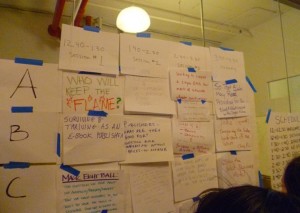 Above is just one of the dozens of tweets that emerged from an event I attended today, Book Camp, known as an ‘unconference.’ The first time I heard about Book Camp was in 2010 when one was held in Toronto. I was unable to make that one, but I’ve participated in each of the four Book Camps that has been held in NYC, always on a Sunday. Here’s a blog post I wrote about last year’s Book Camp. It is a supremely ad hoc occasion where, by design, those attending don’t know what they’re going to talk about until the action gets underway. At the outset, a blank wall is at the front of the room and participants begin writing down descriptions of sessions they want to lead, taping these pages to the wall, and the schedule fills in with 4-5 sessions during each of the four 45-minute time blocks, with 10-minute networking intervals between each block. The discussions are invariably about the future of the book and publishing, whether print, digital or Web-based. Potential new initiatives are tabled that we can undertake individually or as an industry. Hosts lead the sessions they’ve offered and attendees decides what discussions they want to join, showing up at each session ready to listen and contribute. And if a session isn’t making it for you, or if you got all you needed after a few minutes, you’re encouraged to get up and move on to another one, with no aspersion cast on the host, or you for leaving. It’s like a no-fault divorce. All this stands in contrast to more scripted gatherings such as Digital Book World and Tool of Change (ToC)–with the latter handily following in the days after Book Camp. With lots of book and tech people in NYC from out of town for ToC, it’s an ideal time for this unconference, which charges no admission, though space is limited.
Above is just one of the dozens of tweets that emerged from an event I attended today, Book Camp, known as an ‘unconference.’ The first time I heard about Book Camp was in 2010 when one was held in Toronto. I was unable to make that one, but I’ve participated in each of the four Book Camps that has been held in NYC, always on a Sunday. Here’s a blog post I wrote about last year’s Book Camp. It is a supremely ad hoc occasion where, by design, those attending don’t know what they’re going to talk about until the action gets underway. At the outset, a blank wall is at the front of the room and participants begin writing down descriptions of sessions they want to lead, taping these pages to the wall, and the schedule fills in with 4-5 sessions during each of the four 45-minute time blocks, with 10-minute networking intervals between each block. The discussions are invariably about the future of the book and publishing, whether print, digital or Web-based. Potential new initiatives are tabled that we can undertake individually or as an industry. Hosts lead the sessions they’ve offered and attendees decides what discussions they want to join, showing up at each session ready to listen and contribute. And if a session isn’t making it for you, or if you got all you needed after a few minutes, you’re encouraged to get up and move on to another one, with no aspersion cast on the host, or you for leaving. It’s like a no-fault divorce. All this stands in contrast to more scripted gatherings such as Digital Book World and Tool of Change (ToC)–with the latter handily following in the days after Book Camp. With lots of book and tech people in NYC from out of town for ToC, it’s an ideal time for this unconference, which charges no admission, though space is limited.
I led a session about ‘monetizing’ one’s website, an ungainly term that I’ll continue using until a better one comes along. I’ve begun making money with this blog and website, and am embarked on learning more fully how to convert the Web assets I’m creating in to income, and do it with greater focus and savvy. The session drew a good turnout and I’m grateful to everyone who came, with each person around the table speaking up and participating. I learned a lot, while also taking the opportunity to talk about The Great Gray Bridge and describe the curatorial impulse that drove me to create it in 2011, an impulse that continues to fuel my writing for it virtually everyday. I explained how, upon leaving corporate publishing in 2009, when I no longer had a publishing list to assemble of 20-25 books each year, I felt bereft and for a time, oddly uninspired. After a couple years of that arid feeling, I realized I needed a new garden to tend, and what’s more, that I could plant it with the seed of my own writing, and assemble my own little jewel box of a website.
Book Camp is organized by a posse that includes Chris Kubica, Ami Greko, and Kat Meyer, each denizens of the evolving digital book universe. This year we were fortunate to have space provided by Workman Publishing, in its light and spacious offices on Varick Street in Tribeca. If you’re interested in the concept of an unconference, and Book Camp in particular, I encourage you to visit the Book Camp website and follow today’s discussion on Twitter under the hashtag #Book2. I will try and add more to this post over the next day or two, but after a full day at it, I’m going to close my report for now, after first putting up a couple more of my grainy pictures. (Note to self: don’t forget to bring good camera next time!)

 #FridayReads, Feb. 22–Siege 13: Stories by Tamas Dobozy, an innovative collection of short fiction that oscillates between the Nazi siege of Budapest in 1944 and the present day. I’ve just begun digging in to the book, but find I’m already astonished by the fluency of the writing, and the way the stories pull me right in. I don’t have too much to say about it yet, so I’ll note here the review of it that ran in Quill & Quire, the magazine of the Canadian book industry (Siege 13 was published simultaneously in the US and Canada). The reviewer is writer Robert Wiersema:
#FridayReads, Feb. 22–Siege 13: Stories by Tamas Dobozy, an innovative collection of short fiction that oscillates between the Nazi siege of Budapest in 1944 and the present day. I’ve just begun digging in to the book, but find I’m already astonished by the fluency of the writing, and the way the stories pull me right in. I don’t have too much to say about it yet, so I’ll note here the review of it that ran in Quill & Quire, the magazine of the Canadian book industry (Siege 13 was published simultaneously in the US and Canada). The reviewer is writer Robert Wiersema:



